
How to Write a Private Equity Resume - Advice and Resume Examples

For the right type of person, private equity is a highly rewarding line of work, both emotionally and financially. Entry-level private equity analysts can report salaries of $120,000 per year, but it’s also an intensely competitive career.
So if you want to improve your chances of finding success in private equity, you need a top-tier private equity resume. That’s where we come in! In this post, we’ll cover the following points:
- What is private equity?
- How to write a private equity resume (with examples)
- Private equity resume templates
- Private equity resume examples
Stand Out in Competitive Private Equity Roles
PE firms seek out candidates with both technical skills and strategic thinking, as these are essential for competitive jobs in the field. Emphasize any private equity work that involved high-level strategy, such as restructuring, portfolio management, or valuation projects. Mentioning these skills in your resume summary, skills, and experience sections can give you an edge among experienced professionals in the private equity recruiting process.
What is Private Equity?
Private equity firms invest in companies that are not publicly traded. This allows them to acquire some control over a company’s operations, productivity, and profitability. They can then make changes to a company to increase its value, so they can sell their investment later for a profit.
People working in private equity usually do all of this on behalf of high-net-worth investors. It’s a line of work that involves making high-risk decisions with huge amounts of money—so it’s not for the faint of heart! As a private equity analyst, here’s what you can expect to do from day to day:
- Use modeling techniques to decide investment strategies
- Design hedging strategies to gather information
- Prepare reports and make recommendations based on analysis
- Liaise with external contacts
- Develop strategic plans for portfolio companies
In this section, we’ll show you some amazing examples of private equity resumes. We’ll also take you through the standard resume format, so you know exactly how get started.
Choosing the Right Private Equity Resume Format
The right format depends on your experience level and specific job search needs:
-
Reverse Chronological Format for Experienced Professionals – If you have a solid track record in finance or private equity, this format is ideal, as it highlights your most recent, relevant achievements, which hiring managers prioritize.
-
Functional Format for Career Changers or Those with Gaps – If you’re transitioning to private equity from another field or have employment gaps, a functional format lets you emphasize transferable skills like financial analysis, valuation, and strategic thinking over job titles.
-
Combination Format for a Balanced Approach – For candidates with both relevant experience and strong skills, the combination format can effectively showcase key skills upfront, followed by a summary of relevant roles. This format works well for mid-career professionals looking to highlight both experience and specific competencies.
-
Compact, One-Page Format for Early-Career Professionals – If you're a recent graduate or have under five years of experience, a concise, one-page resume that focuses on internships, coursework, and relevant skills shows your potential without overwhelming the recruiter with less-relevant details.
-
Portfolio-Driven Format for Senior-Level Executives – Seasoned professionals with extensive experience and a strong portfolio of deals or investment achievements may benefit from a slightly longer resume that includes a "Key Transactions" or "Portfolio Highlights" section to underscore major successes in a direct, visual manner.
How to Write a Private Equity Resume Summary
Here’s an example of a top-tier private equity resume summary:
Investment banker with five years of experience managing sales and investments at Walkers Bank. In current role, assisted with over 20 M&A deals worth an average of $1 billion each. Seeking to grow returns and pursue bold new investments at AKB Capital.
This works because it gets to the heart of why this candidate suits the requirements of the job. It calls attention to their experience, their strongest skills, and their most relevant achievements. It also shows their commitment to the company they’re applying for by mentioning its name specifically—an easy way to show that you haven’t just copied and pasted a generic summary into your resume.
How to Write a Private Equity Resume Experience Section
-
Organize in Reverse-Chronological Order: List your most recent position first, working backward. This standard order highlights your most relevant experience upfront.
-
Include Essential Role Details:
- Job Title
- Company Name
- Dates of Employment (approximate dates work)
-
Highlight Key Achievements: Use bullet points for clarity, focusing on major accomplishments. Emphasize metrics-driven achievements that showcase your impact, such as deal closures, portfolio growth, or investment performance.
-
Use Quantifiable Metrics: Support your achievements with concrete statistics like ROI, revenue growth, or portfolio size. These metrics make your successes tangible and impactful.
-
Focus on Private Equity-Relevant Skills: Tailor each entry to emphasize skills valued in private equity, such as financial modeling, due diligence, transaction experience, and market analysis. Demonstrate your ability to drive financial outcomes, manage investments, and conduct in-depth analysis.
Example:
- Increased ROI by 20% in a $30M portfolio through strategic asset allocation.
- Led due diligence on 12 acquisition targets, resulting in 5 successful buyouts with an average IRR of 22%.
- Enhanced financial modeling processes, reducing reporting time by 30%.
A well-crafted experience section that emphasizes measurable results and private equity-relevant skills will make your resume stand out to recruiters.
Here are some more examples of a work experience listing for private equity professionals:
Private Equity Resume
Private Equity, Analyst | October 2017-present Walkers Bank | New York, NY
- Supported and closed over 20 M&A deals with an average worth of $1 billion
- Worked closely with high-profile clients and internal management team members, participating on engagement teams over 10 full transactional execution cycles
- Created and analyzed financial models to support valuations and maximize returns
Because this candidate has prior experience in investment banking rather than private equity, they’ve carefully selected the most relevant parts of their work experience here. They’ve chosen achievements, backed up by statistics, that reflect what a private equity hiring manager will want to see. Plus, this listing highlights several relevant skills—including analytical skills, networking skills, and industry knowledge.
Private Equity Resume Example
Private Equity Associate
-
Conducted in-depth financial analysis and valuation modeling for potential acquisitions, supporting strategic decision-making in portfolio growth.
-
Participated in due diligence processes, collaborating with cross-functional teams to assess target companies' financial health and market position.
-
Managed client relationships by preparing and presenting financial reports, enhancing investor communication and transparency.
-
Played a key role in deal sourcing and evaluating potential acquisition targets to align with the firm’s strategic objectives.
Private Equity Resume Example
Private Equity Analyst
-
Analyzed market trends and developed financial models to evaluate potential investments, providing key insights for executive decision-makers.
-
Assisted in the transaction execution of leveraged buyouts, contributing to successful acquisitions and expanding the firm's investment portfolio.
-
Supported portfolio management by monitoring performance and identifying value-creation opportunities for portfolio companies.
-
Created financial advisory presentations and due diligence materials to inform stakeholders and streamline deal processes.
Private Equity Resume Example
Private Equity Intern
-
Developed proficiency in investment strategies by conducting market research and analyzing industry trends to identify profitable opportunities.
-
Assisted senior associates with financial modeling and valuation analysis for prospective deals, gaining hands-on experience in private equity analysis.
-
Prepared comprehensive due diligence materials for transaction support, contributing to the team’s ability to make informed decisions.
-
Gained exposure to client relationships by participating in meetings and supporting the preparation of presentation materials.
Private Equity Resume Example
Private Equity Associate
-
Conducted comprehensive financial strategies analysis to drive portfolio growth and maximize investment returns.
-
Led due diligence efforts for new acquisitions, including financial modeling and operational cost analysis to assess target viability.
-
Collaborated with management on corporate development initiatives, supporting strategic acquisitions that aligned with the firm’s growth plan.
-
Built extensive due diligence materials to support investment decisions, facilitating efficient transaction execution.
Investment Banking Resume Example
Investment Banking Analyst
-
Performed financial valuation analysis and strategic alternatives analysis for mergers, acquisitions, and capital-raising transactions.
-
Supported investment banking processes through market research, industry analysis, and the preparation of financial advisory presentations.
-
Assisted in leveraged buyout analyses and created detailed financial models to evaluate transaction structures and returns.
-
Fostered client relationships by participating in strategy sessions and delivering analytical insights that informed client decisions.
How to Write a Private Equity Resume Education Section
When you don’t have much work experience behind you, your education section is crucial. It’s a great way to add value to your resume, showing that you have the skill and the dedication it takes to work towards a qualification.
Like your work experience section, your education should usually be listed in reverse-chronological format. Start with your newest qualification (which will usually be your most advanced qualification), and work back. Include the qualification you earned, the institution where you earned it, and the dates of the beginning and end of your studies.
You can also include any awards, prizes or accolades you earned during your studies. But if you already have plenty of work experience, this can take up space that could be used more wisely. It’s usually only a good idea to do this if you’re a fairly recent graduate—or if those accolades were really prestigious.
Here’s an example of an education section for a private equity resume:
Master of Business Administration | September 2015-June 2016 Harvard University, Massachusetts
Bachelor of Science in Finance | September 2011-June 2015 New York University, New York
This section doesn’t need much detail! It makes it easy for hiring managers to verify the candidate’s qualifications if necessary, and it shows that they meet the minimum requirements of the job description. If the candidate had graduated more recently, they could also have chosen to list any academic prizes or honors in bullet points underneath their bachelor’s degree.
Educational Background in Business Administration
For those entering private equity, a background in business administration or finance can strengthen your resume. Include your degree, relevant coursework, and honors if recent. Experienced candidates may also want to showcase advanced degrees like an MBA, which can set you apart from other investment professionals in PE firms.
Key Skills for Private Equity Resumes
- Financial Modeling – Show skills in financial models and financial modeling for in-depth analysis and strategic insights
- Valuation Analysis – List expertise in financial valuation analysis methods such as Discounted Cash Flow (DCF) and Comparable Company Analysis (CCA)
- Industry Expertise – Demonstrate knowledge of industry trends to inform investment decisions
- Deal Sourcing and Evaluation – Show proficiency in due diligence to assess potential acquisition targets
- Financial Analysis – Display strong financial analysis skills supporting investment strategies
- Transaction Execution – Describe experience in executing leveraged buyouts and other strategic operations
- Communication and Presentation – List strong communication skills for financial advisory presentations and client relationships
- Strategic Thinking – Show ability to conduct market research and investment banking analysis for optimal portfolio management
- Team Collaboration – Demonstrate effective teamwork, contributing to corporate development and portfolio growth
- Entrepreneurial Mindset – Emphasize focus on value creation and driving revenue growth through innovation
- Operational Cost Analysis – Show skills in analyzing operational costs to improve financial efficiency
- Due Diligence Processes – Highlight experience in due diligence processes and extensive due diligence materials preparation
- Financial Strategies – Display knowledge of financial strategies to optimize portfolio performance
- Analytical Skills – List analytical skills supporting data-driven decisions in private equity
- Management Consulting – Show background in management consulting for effective corporate development
- Market Trends Analysis – Demonstrate expertise in analyzing market trends to identify strategic opportunities
- Investment Strategies – Describe skills in formulating investment strategies for successful investments
- Leveraged Buyout Analysis – Show expertise in leveraged buyout assessments to drive growth
- Strategic Alternatives Analysis – Highlight experience in strategic financial alternatives analyses for optimal investment outcomes
Key Private Equity Positions to Showcase on Your Resume
Private equity positions are highly specialized, and each requires specific skills and accomplishments. Tailor your resume to the position you're targeting by focusing on relevant experience and achievements in similar roles:
-
Analyst – Showcase your investment analysis and financial modeling experience to highlight analytical capabilities.
-
Associate – Emphasize your work in deal sourcing, valuation, and client relationships, as these are crucial at this level.
-
Vice President or Above – Highlight leadership experience, including managing investment professionals, driving deals, and setting strategic direction.
Organizing your resume by employment history with job-specific achievements gives recruiters insight into your fit for these private equity roles.
Common Mistakes in Private Equity Resumes
Crafting a private equity resume requires precision, industry knowledge, and a focus on impact. Here are some frequent mistakes that can hinder your application’s success:
-
Neglecting Reverse-Chronological Order – Hiring managers expect to see resumes organized in reverse-chronological order, as this format quickly highlights the candidate’s recent and relevant experience. Not following this standard order can make it difficult for recruiters to assess your career progression at a glance.
-
Overlooking Quantifiable Achievements in Professional Experience – PE firms and investment professionals prioritize measurable impact. Candidates often miss the mark by listing responsibilities instead of achievements. Each bullet point should showcase professional experience through concrete metrics, like ROI improvements, portfolio growth percentages, or successful deal values.
-
Failing to Emphasize Private Equity-Relevant Skills – A strong private equity resume should highlight relevant skills such as investment banking, management consulting, financial modeling, and due diligence. Many candidates make the error of listing generic skills rather than specifying their expertise in private equity functions, which are critical in this competitive job market.
-
Not Addressing Private Equity Recruiting Preferences – Private equity recruiting often favors candidates who demonstrate a clear understanding of the industry and a history of strategic decision-making. Failing to tailor your resume to showcase skills valued by hiring managers in private equity—such as portfolio management, deal sourcing, and valuation—can weaken your application.
-
Misrepresenting Employment History – Inaccurate or incomplete employment history details can be a red flag for recruiters. It’s crucial to provide full job titles, company names, and dates, ensuring that every role presented is relevant and transparently documented. Failing to do so can raise questions about the candidate’s professionalism and attention to detail.
-
Lacking Focus on Relevant Experience for Career Changers – For those transitioning from roles like management consulting or other finance positions, it’s essential to highlight relevant experience that aligns with private equity demands. Many candidates overlook key transferable skills, making it harder for PE firms to assess their potential fit.
-
Underestimating the Importance of Consistency and Formatting – A technically focused and visually streamlined resume is expected in private equity, as these roles demand precision. Formatting errors, inconsistencies, or a lack of clarity can negatively impact how hiring managers perceive your attention to detail—a critical skill in this field.
Avoiding these common mistakes will significantly improve the impact of your resume, helping you present yourself as a strong candidate for competitive roles in private equity.
Private Equity Resume Template
As a private equity analyst, you’ll need to present yourself with high levels of professionalism at all times. That means it’s generally a smart idea to pick a streamlined, professional resume template. A template with too many flourishes and decorative touches might risk making you look frivolous, and hurting your chances of success.
But standards vary between firms—so look into the firm where you want to work, and make your choices accordingly! Remember, VisualCV offers an amazing range of templates, so you’re guaranteed to find something that works for you. Whatever you need from your resume template, we’ve got your back.
Private Equity Resume Examples
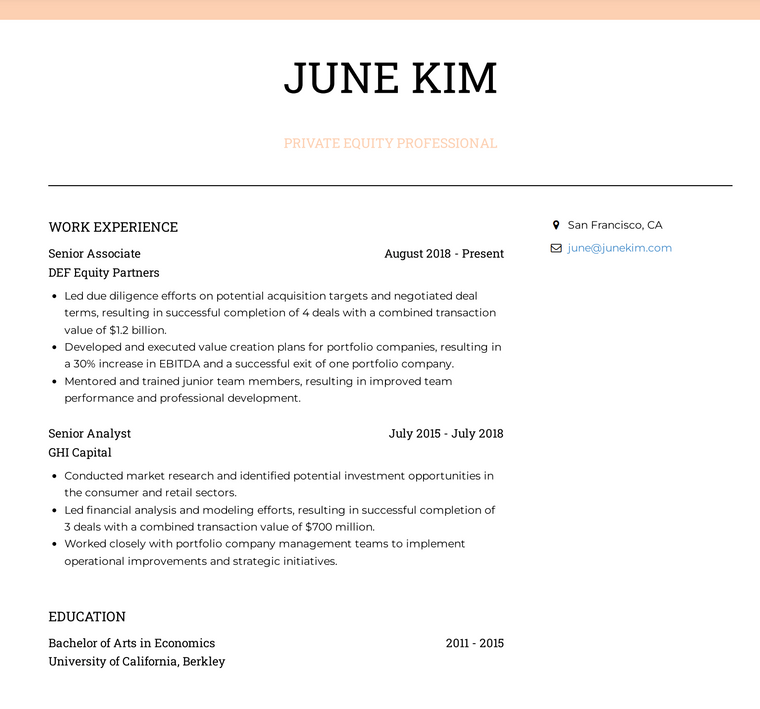
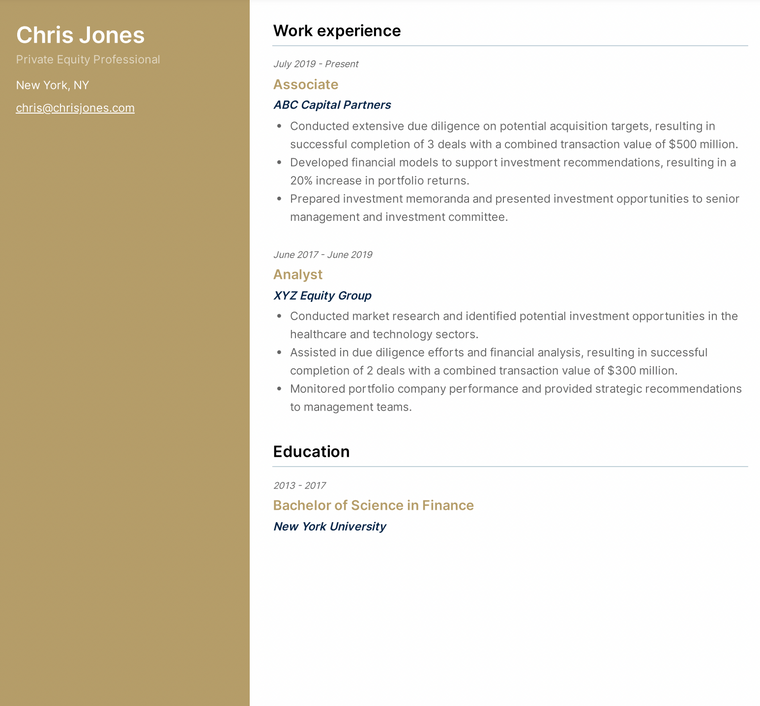
Private Equity Vice President Resume
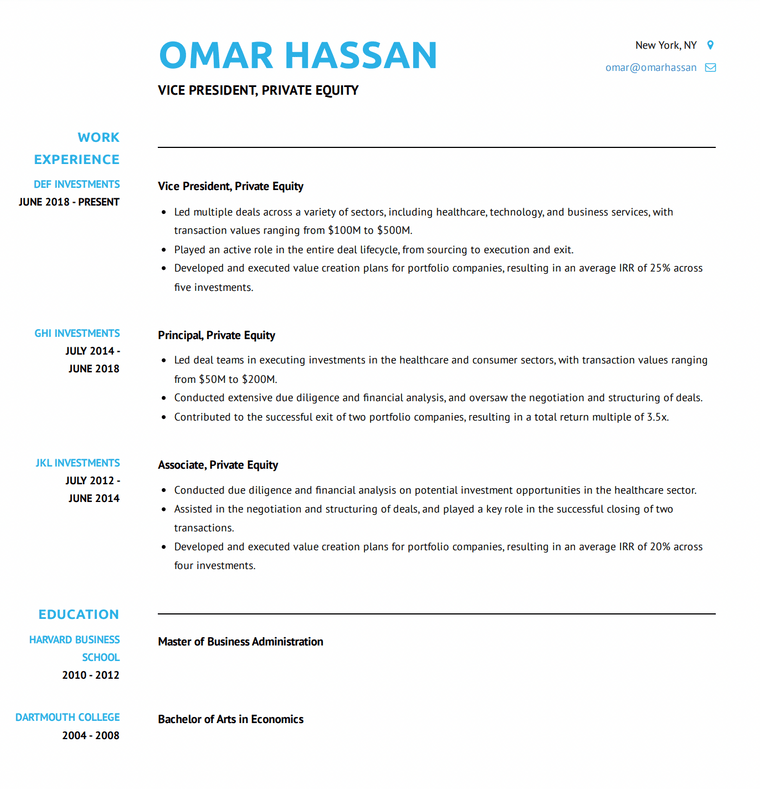
Private Equity Intern Resume
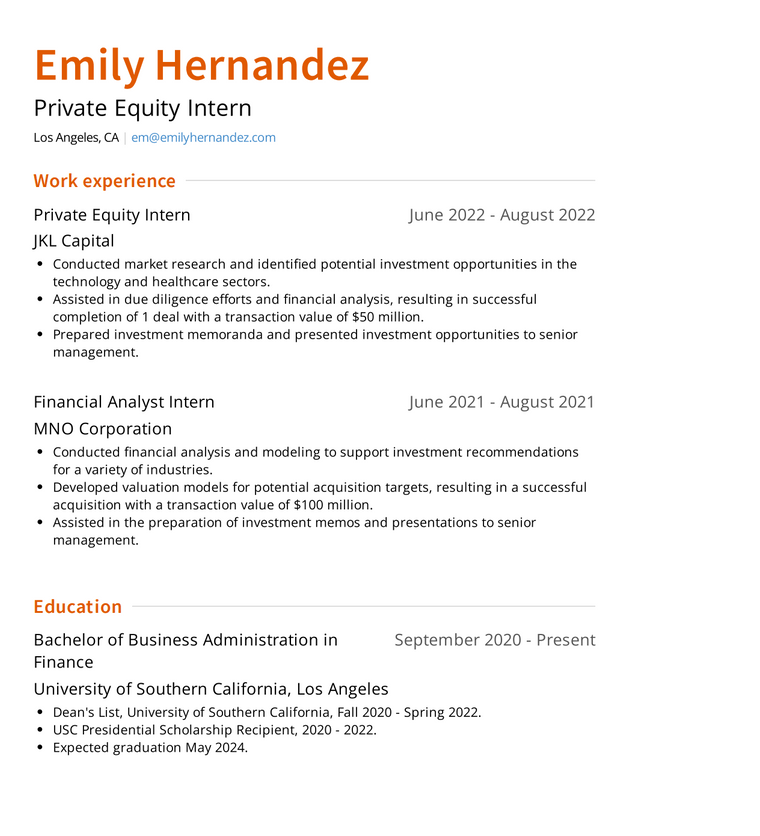
Private Equity Associate Resume Example
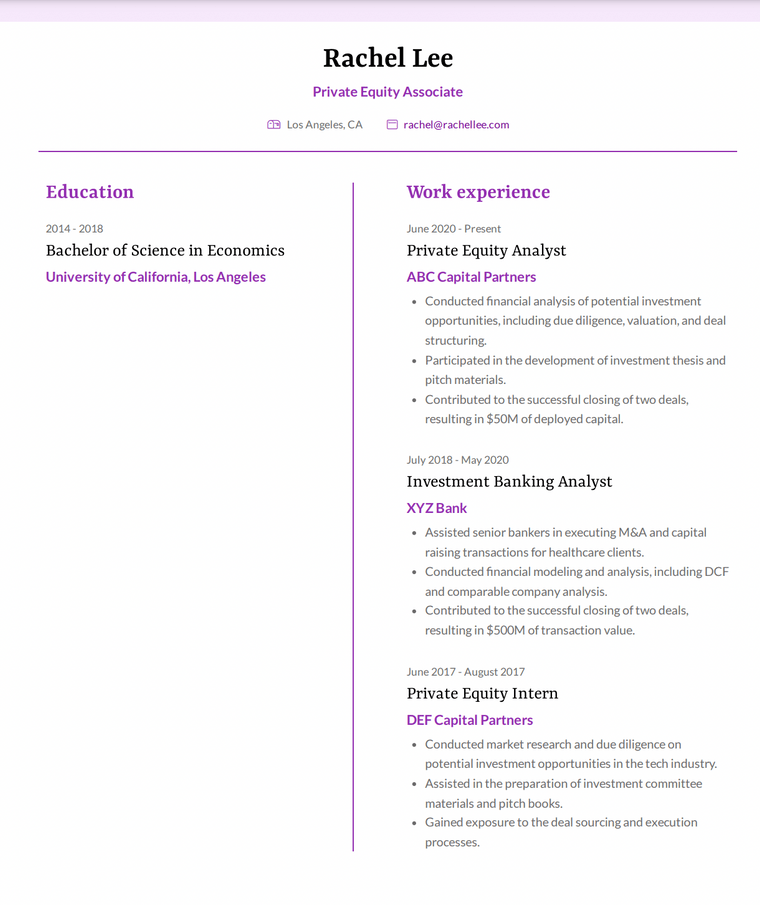
- Stand Out in Competitive Private Equity Roles
- What is Private Equity?
- Choosing the Right Private Equity Resume Format
- How to Write a Private Equity Resume Summary
- Private Equity Resume
- Private Equity Resume Example
- Private Equity Resume Example
- Private Equity Resume Example
- Private Equity Resume Example
- Investment Banking Resume Example
- How to Write a Private Equity Resume Education Section
- Key Skills for Private Equity Resumes
- Key Private Equity Positions to Showcase on Your Resume
- Common Mistakes in Private Equity Resumes
- Private Equity Resume Template
- Private Equity Resume Examples

Written By
Madison Norton
VP Marketing & Resume Expert
Madison is the VP Marketing and General Manager at VisualCV. He's a seasoned marketing leader, resume writing and career marketing expert and now helping people grow their own career marketing strategies to build a career they love.

When you decide to take your career in a different direction, it's important to write a great career change resume.
May 4, 2022
Read Post

Community Success Manager & CV Writing Expert

Creating a perfect Salesforce Developer resume can be make or break for landing your next job interview - discover our comprehensive resume guide here.
May 5, 2023
Read Post

Content Writer + Resume Expert

CV Photo Advice and Tips: Should your CV have a photo?
June 26, 2020
Read Post

Co-Founder & Director
Copyright ©2025 Workstory Inc.